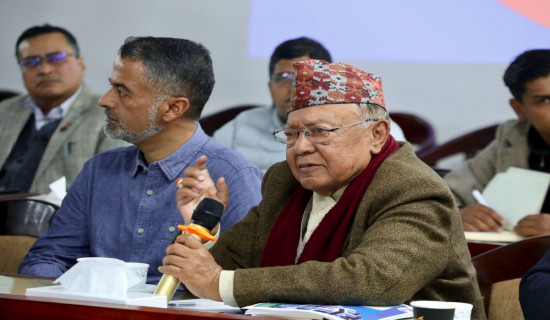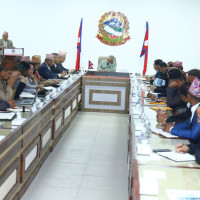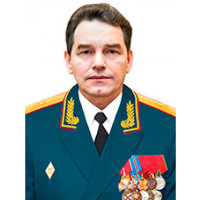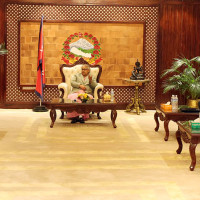- Tuesday, 23 December 2025
Democracy Day
Overcoming Structural Challenges of Democracy
One of the world’s oldest nations, Nepal boasts a tradition of ancient enlightenment and modern democratic evolution. The blend of ancientry and modernity puts the Himalayan nation in a unique position, distinct from other nations. The term ‘democracy’ is generally understood as the rule of people, either through their direct participation in the political process and governance affairs or by sending their representatives to conduct these tasks. Though the very word might not have been used, its spirit was embraced in ancient times in Nepal.
Even before the ancient city-state of Athens started to use the word ‘democracy,’ it had already been adopted and implemented in the East. In the ancient kingdom of Bideh, which was located in present-day Janakpur in the south of Nepal, King Janak applied the concept of ‘philosopher king’ that was theorised by Plato many centuries later. The notion was the cornerstone of Greek philosophers ideal state, which is akin to the ‘utopia’ of pre-Marxist philosophers and Marx’s vision of classless society.
Critical discourse
According to Plato, rulers, like philosophers, must possess knowledge, intelligence, wisdom, training, and basic skills to govern the state, thereby ensuring the welfare of the people. King Janak had emulated these virtues and conducted the shastrartha (critical discourse), in which rishis (sages) rigorously deliberated on the fundamental elements of the universe and human life—its existence, aim, knowledge, morality, and duties of the state. People of all walks of life joined this debate. It is a mode of consultation applied to resolve conflict and ensure justice for the victims. It is a dharma-based justice system that goes beyond a legalistic and logic-guided approach. The concept of dan to the poor and public education had received greater prominence in society. The gist of the idea, churned out by the assembly of savants, served as the guideline for the king to establish relations with the people and handle the affairs of the state.
Nepalis have imbibed the tradition of enlightenment of the Vedas, Janak, and Buddha, which offer theoretical and practical insight into comprehending and embracing the ideas of democracy, governance, justice, and public morality. This might sound strange for the West, which claims as if ‘democracy’ exclusively belongs to it. The age-old enlightenment tradition has been embedded in the collective consciousness of Nepalis. This is a reason why they are not afraid of fighting for democracy, civil liberties, equality, and justice, as reflected in various movements, uprisings, and revolutions. Nepalis have not tolerated autocracies of different hues. During peacetime, they have made rational choices through ballots. The political parties that fail to translate electoral promises into action have been removed from the seat of power.
The 1951 political change, also known as the sat sal ko kranti (revolution that occurred in 2007 B.S.), was the first ever revolution that toppled the Rana Oligarchy and established multiparty democracy. The epoch-making political change transformed the people from raitis (subjects) to citizens. The Nepali people, for the first time, enjoyed the taste of freedom, breaking the shackles that had fettered them for over a century. The new political environment put the country on the path of modernization. Human rights, periodic elections, freedom of the press, and an independent judiciary became the new lexicons of Nepali politics. The opening up to the outer world gave Nepalis exposure to new concepts of modern education, political thought, and technology.
Sat sal ko kranti is considered the foundation as well as the fountain of subsequent political movements waged for equality, autonomy, and dignity for the marginalised people who have been facing structural injustice for centuries. The people’s movement of 1990 and the April Uprising of 2006 have proved milestones in further advancing Nepali society. They brought unprecedented changes in terms of an increase in people’s awareness, living standards, civic associations, and use of information technology. The rise of social media catapulted society into another phase of the information revolution that connected people and nations through the digital highway. It has changed the way people communicate with and react to others. For all its shortcomings, social media pushed the frontiers of knowledge and broadened the scope of participatory democracy.
Transformation
Nepal’s transformation into a federal democratic republic through the new constitution promulgated by the Constituent Assembly in 2015 marks the adoption of a comprehensive and refined form of democracy, with a greater focus on inclusion, gender parity, and the upliftment of disadvantaged social and economic groups. However, our democracy requires fixing scores of structural problems. One chronic malaise is the patriocracy, which has not only polarised the political spectrum but also weakened the key organs of state, resulting in the loss of their credibility and trust. Public institutions must be impersonal and efficient so that they are able to carry out their constitutional duties fairly. The effectiveness and resilience of democracy lie in the competency of the state’s institutions to deliver goods and services to citizens without hassle.
People’s constant vigilance and ability to make informed choices at the ballot box can play a critical role in institutionalising democracy. However, periodic elections are not enough. Democratisation of leadership as well as the structures of political parties is a must to channel the grassroots’ voice into policy and law-making bodies. This necessitates promoting organic intellectuals, impartial media, and civic organisations that have the guts to call a spade a spade. Strong economies, stability, and balanced foreign policy are equally important for democracy to function, thrive, and deepen.
As the country observes Democracy Day today, it is imperative to reflect on the weaknesses and strengths of our democratic polity. Political actors must adhere to constitutional norms, values, and conduct, thereby securing people’s confidence in their capacity to safeguard a nation’s sovereignty and attain the inclusive economic growth necessary for democratic order, peace, and prosperity in the country.
(The author is Deputy Executive Editor of this daily.)
















